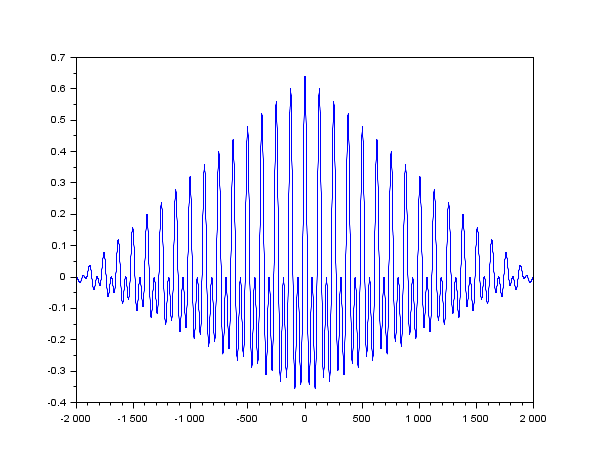Please note that the recommended version of Scilab is 2026.0.1. This page might be outdated.
See the recommended documentation of this function
xcorr
Computes discrete auto or cross correlation
Syntax
[c [,lagindex]] = xcorr(x [,maxlags [,scaling]]) [c [,lagindex]] = xcorr(x,y [,maxlags [,scaling]])
Parameters
- x
a vector of real or complex floating point numbers.
- y
a vector of real or complex floating point numbers. The default value is
x.- maxlags
a scalar with integer value greater than 1. The default value is
n. Wherenis the maximum of thexandyvector length.- scaling
a character string with possible value:
"biased","unbiased","coeff","none". The default value is"none".- c
a vector of real or complex floating point numbers with same orientation as
x.- lagindex
a row vector, containing the lags index corresponding to the
cvalues.
Description
c=xcorr(x)computes the un-normalized discrete auto correlation: and return in
and return in
cthe sequence of auto correlation lags with
with
nis the length ofxxcorr(x,y)computes the un-normalized discrete cross correlation: and return in
and return in
cthe sequence of auto correlation lags with
with
nis the maximum ofxandylength's.
If the maxlags argument is given
xcorr returns in c the sequence of
auto correlation lags  . If
. If
maxlags is greater than length(x),
the first and last values of c are zero.
The scaling argument describes how
 is normalized before being returned in
is normalized before being returned in
c:
- "biased":
c=
/n. - "unbiased":
c=
./(n-(-maxlags:maxlags)). - "coeff":
c=
/(norm(x)*norm(y)).
Remark
The corr function computes the "biased" covariance ofx
and
y
and only return in
c
the sequence of auto correlation lags
 .
.Method
This function computes using
using
ifft(fft(x).*conj(fft(y))).Examples
t = linspace(0, 100, 2000); y = 0.8 * sin(t) + 0.8 * sin(2 * t); [c, ind] = xcorr(y, "biased"); plot(ind, c)

Authors
- Serge Steer, INRIA
Used Functions
History
| Version | Description |
| 5.4.0 | xcorr added. |
| Report an issue | ||
| << hank | Correlation Convolution | Filters >> |